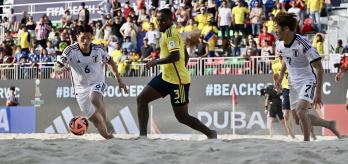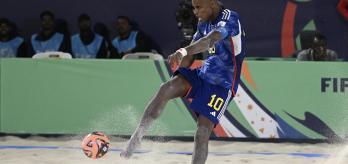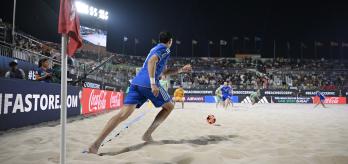When they claimed yet another beach soccer World Cup title in Dubai, Brazil became the first team in any FIFA-recognised discipline to be crowned World Champions on six occasions. On top of that, forward Rodrigo made history of his own by becoming just the fifth player ever to score three goals in the final. The tournament finale between Brazil and Italy was an intriguing encounter that pitted two contrasting styles of play against each other. In that respect, it was truly representative of a tournament that proved fascinating both tactically and technically.
Trends covered in the analysis
The members of FIFA’s Technical Study Group (TSG) attended all 32 matches at FIFA Beach Soccer World Cup UAE 2024™ to observe, analyse and identify the latest innovations and trends, and this technical report will inform and expand on their findings. In this first article, we focus on the significantly increased role of goalkeepers in attacking play (see below), which was perhaps the biggest trend to emerge this tournament. In addition, the post-tournament report covers:
GOALKEEPERS TAKE CENTRE-STAGE
The TSG noted that goalkeepers played a much more active role on the pitch in 2024 in comparison to previous tournaments, particularly in their respective teams’ attacking play. Their observations were borne out by FIFA’s Football Performance Insights team, who confirmed that goalkeepers scored 11 goals, a new record for a FIFA Beach Soccer World Cup. They also provided 40 assists and registered no fewer than 408 attempts at goal between them.
Iran’s goalkeepers were more involved with their team’s attacking play than any other goalkeepers in the tournament. Hamid Behzadpour (1) had 39 attempts at goal, scored three goals and provided five assists, while his team-mate Seyed Mirjalili (12) recorded 30 attempts, scored two goals and contributed one assist. Incredibly, the two goalkeepers combined to score three goals between them in Iran’s group-stage match against Tahiti.
Other goalkeepers to get on the scoresheet (all scoring one goal) were Mikhail Avgustov (BLR), Chris Toth (USA), Austin Collier (USA), Dona (ESP), Ousseynou Faye (SEN), and Yusuke Kawai (JPN).
Belarus goalkeeper Mikhail Avgustov (12) saw the most action overall. He was between the sticks for 219 minutes and 38 seconds, which equated to all but two minutes and 22 seconds of his team’s total game time.
The increased involvement of goalkeepers, particularly in attacking phases of play, provides food for thought. Given their increasingly influential attacking roles, there is now a strong argument for defending teams treating them in the same way as they would outfielders. As Switzerland international Dejan Stankovic explains:
“Several teams in this competition had two really strong goalkeepers, especially Iran and Brazil. Having a goalkeeper with real quality on the ball gives teams an advantage, but having two goalkeepers that can make good decisions in possession about when to shoot [and] when to pass, is game-changing, and can really hurt opposition teams. Every team needs goalkeepers who can defend and prevent goals being scored, but when they can make big contributions to how their teams attack, it poses big questions for opposition teams about how to press.”
Fellow TSG member Matteo Marrucci, who represented Italy at three Beach Soccer World Cups, agreed this represented a significant development:
“It was iconic to see Brazil winning the tournament after many years, but it was interesting to see how they used their goalkeepers. Traditionally, Brazil’s goalkeepers have not really got involved in attacking play, because they always have so much quality outfield. But in this tournament they used their goalkeepers much more than I have seen before and Bobo provided four assists. This is a change for them and was a big trend across other teams.”
In the clips below, we examine some of the 11 goals scored by goalkeepers during the FIFA Beach Soccer World Cup 2024.
To see more goals from FIFA Beach Soccer World Cup 2024 click here.
Summary
FIFA Beach Soccer World Cup UAE 2024™ was a record-breaking tournament in many ways, but the biggest shift came in the goalkeepers’ involvement in their teams’ offensive play. The men between the posts scored 11 goals scored and 40 assists, suggesting that the role of the goalkeeper in attacks has changed markedly, and this will affect how teams defend and press in the future. The quality of both goalkeepers in squads is also improving, meaning teams can rotate their goalkeepers without compromising their overall performance.
The changing role of the goalkeeper is a common thread running through many of the trends to emerge from this tournament. The rest of this series of post-tournament articles will explore these trends in more detail.



















